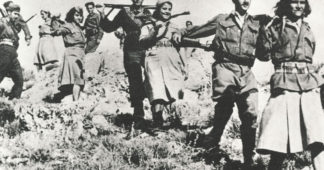The occupation of Greece by the Axis Powers began in April 1941 after Nazi Germany invaded the Kingdom of Greece in order to assist its ally, Italy, in their ongoing war that was initiated in October 1940, having encountered major strategical difficulties. Following the conquest of Crete, the entirety of Greece was occupied starting in June 1941. The occupation of the mainland lasted until Germany and its ally Bulgaria withdrew under Allied pressure in early October 1944, with Crete and some other Aegean islands being surrendered to the Allies by German garrisons in May and June 1945, after the end of World War II in Europe.
Fascist Italy had initially declared war and invaded Greece in October 1940, but had been pushed back by the Hellenic Army into neighbouring Albania, which at the time was an Italian protectorate. Nazi Germany intervened on its ally’s behalf in southern Europe. While most of the Hellenic Army was located on the Albanian front lines to defend against Italian counter-attacks, a rapid German Blitzkrieg campaign took place from April to June 1941, resulting in Greece being defeated and occupied. The Greek government went into exile, and an Axis collaborationist government was established in its place. Greece’s territory was divided into occupation zones run by the Axis powers, with the Germans administering the most important regions of the country themselves, including Athens, Thessaloniki and strategic Aegean Islands. Other regions of the country were run by Germany’s partners, Italy and Bulgaria.
The occupation reduced the Greek economy and brought hardships to the Greek civilian population. Much of Greece’s economic capacity was destroyed, including 80% of industry, 28% of infrastructure (ports, roads and railways), 90% of its bridges, and 25% of its forests and other natural resources. Along with the loss of economic capacity, an estimated 7-11% of Greece’s civilian population died as a result of the occupation. In Athens, 40,000 civilians died from starvation and tens of thousands more died from reprisals by Nazis and their collaborators.
The Jewish population of Greece was nearly eradicated. Of its pre-war population of 75–77,000, around 11–12,000 survived, often by joining the resistance or being hidden. Most of those who died were deported to Auschwitz, while those under Bulgarian occupation in Thrace were sent to Treblinka. The Italians did not deport Jews living in territory they controlled, but when the Germans took it over from them, Jews living there were also deported.
Greek Resistance groups were formed during this occupation. These resistance groups launched guerrilla attacks against the occupying powers, fought against collaborationist Security Battalions, and set up espionage networks. By late 1943 the different resistance groups began to fight amongst themselves. At the end of occupation of the Greek mainland in October 1944, Greece was in a state of political polarization, which soon led to the outbreak of civil war. The civil war gave opportunity to those who had prominently collaborated with Nazi Germany or other occupiers to reach positions of power and avoid sanctions because of anti-communism, even eventually coming to power in post-war Greece after the Communist defeat.
The Greek Resistance killed 21,087 Axis soldiers (17,536 Germans, 2,739 Italians, 1,532 Bulgarians) and captured 6,463 (2,102 Germans, 2,109 Italians, 2,252 Bulgarians), compared to the death of 20,650 Greek partisans and an unknown number captured. BBC News estimated Greece suffered at least 250,000 dead during the Axis occupation.
Continue reading at en.wikipedia.org
We remind our readers that publication of articles on our site does not mean that we agree with what is written. Our policy is to publish anything which we consider of interest, so as to assist our readers in forming their opinions. Sometimes we even publish articles with which we totally disagree, since we believe it is important for our readers to be informed on as wide a spectrum of views as possible.











